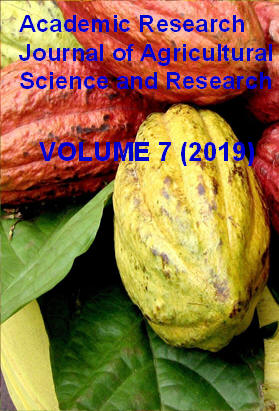|
ISSN: 2360-7874 |
Academic Research Journal of
Agricultural Science and Research |
|||||||||||||||||||
|
Vol. 7(7), pp. 414-422, November 2019 Research Evaluation of Climate Change Impacts on the Water Resources of Awata River Watershed, Genale Dawa Basin: Southern Ethiopia.
Tesfaye Gragn1*, Asfaw Kebede2, Shimelis Berhanu3
1Bore Agricultural Research center, Oromia Agricultural Research Institute, P.O. Box, 21, Bore, Ethiopia *Corresponding Author E-mail: tgragn@gmail.com; Tel.: +251-911-34-16-98
2School
of Water Resource and Environmental Engineering, Institute of
Technology, Haramaya University, P.O. Box, 138, Dire Dawa,
Ethiopia
Accepted 29 October 2019
This research was conducted to study the impacts of climate change on water resources of the Awata River watershed. Statistical Downscaling Model version 5.1.1 has been used to downscale the daily maximum temperature, minimum temperature, and precipitation in 30-year intervals from the second generation of the Earth System Model (CanESM2) under two Representative Concentration Pathways (RCP) Scenarios (RCP4.5 and RCP8.5). Climate change scenarios for precipitation and temperature were developed for two future periods 2018-2047 (the 2020s) and 2048-2077 (2050s). According to the projected climate data, the monthly minimum and maximum temperature are likely to have an increasing trend of +2.94°C and 2.25°C respectively. Regarding the rainfall change, under the RCP4.5 scenario, the study shows an annual average increment of 26.8% and 35.1% at near (2020) and mid-term (2050) respectively. The HBV Light hydrological model was successfully calibrated (2003-2012) and validated (2013-2017) using current climatic inputs and observed river flows. The overall performance of the model was good at the monthly time scale on calibration (R2=0.87) and validation (R2=0.85). Future discharge (2018-2077) was simulated using statistically downscaled 20 ensembles climate scenario data for both RCP4.5 and RCP8.5 scenarios. The average total annual flow at the outlet of the watershed might increase up to 7.3% for the RCP4.5 scenario and 7.0% for the RCP8.5 scenario for the 2018-2047 periods and for 2048-2077 periods it might increase up to 7.7% for RCP4.5 scenario and 7.9% for the RCP8.5 scenario. In conclusion increase in average total annual, seasonal and monthly flow volume is observed for periods which show a corresponding increase in mean annual, seasonal and monthly precipitation during scenario developments so that, future studies must recognize the over-all implication of climate change in the Awata watershed.
Keywords: Awata, Climate change, canESM2, HBV, SDSM, Ethiopia.
How to cite this article (APA Style): Tesfaye G., Asfaw K., Shimelis B. (2019). Evaluation of Climate Change Impacts on the Water Resources of Awata River Watershed, Genale Dawa Basin: Southern Ethiopia.. Acad. Res. J. Agri. Sci. Res. 7(7): 414-422
|
|||||||||||||||||||
